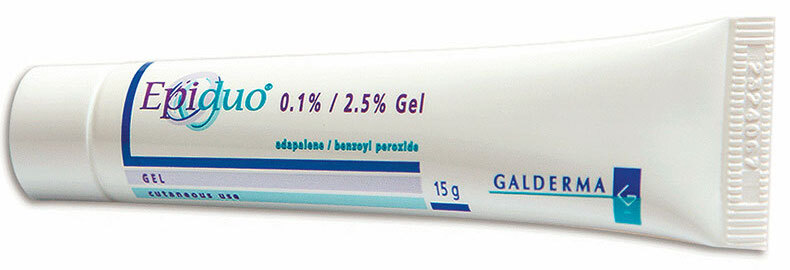Epiduo for Acne: 10 most common questions
1. What is Epiduo?
Epiduo is a topical acne treatment gel comprised of a fixed combination of two antibiotic-free medications, Adapalene (0.1%) and Benzoyl Peroxide (2.5%) Gel. It is a once-a-day prescription that treats existing pimples and prevents new ones from forming.
2. Is Epiduo more effective than Benzoyl Peroxide?
Regarding efficacy, it seems that Epiduo has similar efficacy to Benzoyl Peroxide. This benefit comes with significantly higher irritation. In addition to the negative impacts of irritation on acne production, the side effects often result in reduced commitment to treatment, making it "less effective" comparatively.
Old school and more generic formulations of Benzoyl Peroxide (particularly 5%) can also irritate and dry the skin. However, newer micronized forms of Benzoyl Peroxide available are equally (if not more effective) while causing less irritation, particularly when paired with anti-inflammatory ingredients (such as the natural boosters in MDacne products) and when used in the correct % for the skin type and acne severity of the specific user (typically 2.5%-5%)
3. What are the common side effects of Epiduo?
Skin redness, scaling, dryness, and stinging/burning may be experienced with the use of Epiduo gel. These are most likely to occur during the first four weeks of treatment, are mostly mild to moderate in intensity, and usually lessen with continued medication use. However, irritant and allergic contact dermatitis may occur. Depending upon the severity of these adverse reactions, patients should be instructed to use a moisturizer, reduce the frequency of the application of Epiduo gel, or discontinue use altogether. The product should not be applied to cuts, abrasions, eczematous or sunburned skin. As with other retinoids, "waxing" as a depilatory method should be avoided on skin treated with Epiduo gel.
4. What products do you need to avoid while using Epiduo?
Users will also need to avoid concomitant use of other potentially irritating topical products (medicated or abrasive soaps and cleansers, soaps and cosmetics with strong skin-drying effects, and products with high concentrations of alcohol, astringents, spices, or limes).
5. Why is Epiduo more irritating than other acne treatments?
It seems the combination of Adapalene and Benzoyl Peroxide causes a much greater risk for irritation than each ingredient alone, which is why Epiduo users often experience more significant irritation. Though some initial dryness and irritation are normal with the most effective topical acne treatments, excessive and continuous irritation can worsen acne. Once the skin is over-irritated, the outer protective barrier of the skin is damaged, causing more inflammation, which slows down the skin's healing and increases the risk of acne breakouts.
6. Does Epiduo make you more sensitive to the sun?
Yes. Epiduo is contraindicated with ultraviolet light exposure (i.e., exposure to sunlight), including sunlamps. Patients with high levels of sun exposure and those with inherent sensitivity to the sun should exercise particular caution. When exposure cannot be avoided, sunscreen and protective apparel (e.g., hats, and shirts) are recommended. Weather extremes, such as wind or cold, may also irritate patients under treatment with Epiduo gel.
7. Does Epiduo also help with acne scarring?
The main ingredient in Epiduo is benzoyl peroxide. This Gel, as with all other topical anti-acne treatments, aims to prevent the formation of new active acne pimples. Therefore it will not help treat existing deeper, pitted scars. Nevertheless, preventing new breakouts will prevent the appearance of new acne scars and hyperpigmentation in the future. (update: if you struggle with post-acne hyperpigmentation, we recommend trying our new Dark spot remover)
8. What is the difference between Differin and Epiduo?
Differin (Adapalene) and Epiduo (which contain Adapalene) are two gels commonly used for acne treatment.
Formulations: Differin is sold in 2 forms: Adapalene 0.1%, which can be bought without a prescription (over the counter), and Adapalene 0.3%, which requires a prescription. Epiduo is a combination of Adapalene 0.1% and Benzoyl Peroxide 2.5%. Epiduo Forte combines Adapalene 0.3% and benzoyl peroxide 2.5%.
Use Case: The Differin Gel 0.3% (like other topical retinoids) is most effective only on comedonal acne (blackheads and whiteheads) and only slightly inflammatory acne. However, Benzoyl Peroxide is effective on both comedones and inflammatory pimples. Therefore, the combination of Benzoyl Peroxide and Adapalene in the Epiduo gel allows it to cover both inflammatory acne (papules, pustules) and comedonal acne (blackheads and whiteheads).
*According to updated American Academy of Dermatology treatment guidelines, topical retinoids are recommended as monotherapy in primarily comedonal acne or in combination with topical or oral antimicrobials in patients with mixed or primarily inflammatory acne lesions.
9. What's the price of Epiduo?

As a prescription drug, Epiduo is quite a bit more expensive than Differin and other OTC topical acne treatments. For example, here's how it compares to Differin at Walmart.
- Differin 0.1% 45ml - Walmart $64
- Differin 0.3% 45ml - Walmart $83
- Epiduo 0.1%/2.5% 45ml - Walmart $119
- Epiduo 0.3%/2.5% 45ml - Walmart $416
10. Is it reasonable to use Epiduo and Clindamycin together?
Clindamycin is a topical antibiotic. Unfortunately, most acne bacteria are resistant to topical antibiotics (learn more about the risks of topical antibiotics for acne here), providing limited efficacy on their own. However, because Clindamycin itself is not irritating, it can be used in combination with other topical treatments such as Epiduo or other products containing Benzoyl Peroxide, which will be the key ingredient for treating and preventing acne.
To find the right acne treatments for your unique skin, take the free skin assessment by clicking here.




